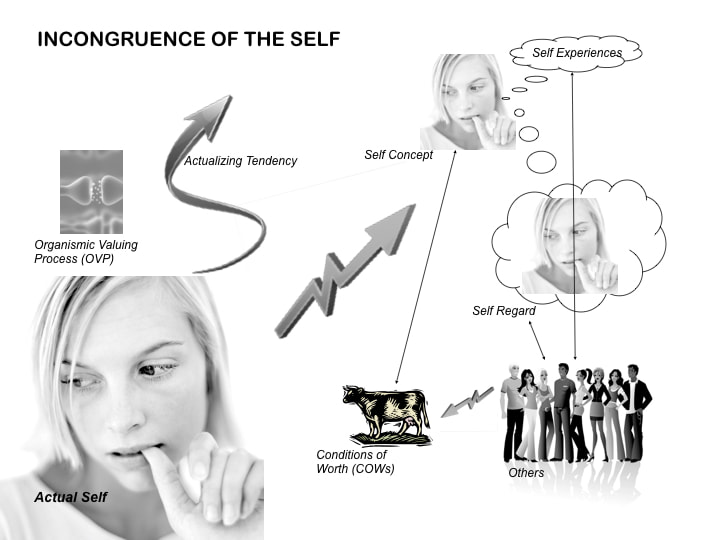|
Person Centered Therapy is an approach often credited to Carl Rogers, and was developed in the 1940s. It is an approach my patients have found very useful over the years, and something I regularly incorporate into sessions. Today’s mental health topic is more information about this theoretical approach. Remember- there are many theories designed to help us understand the way we think and ways to improve our lives- this only represents one of them:
In Person Centered Therapy, we have symptoms when we are “not congruent.” This means that the way we see ourselves versus who we are as defined by our life experiences (our “actual selves”) are different (“incongruent”). The problem is, we listen too much to what others think of us and try to make them happy (“conditions of worth”), instead of listening to our inner voices (“organismic valuing processes”). According to this theory, the goal is to become congruent and “self actualize.” This happens when we are guided by our organismic valuing process, rather than conditions of worth placed on us by others. Think about it looking at the graphic above. We listen too much to what others think and this can negatively impact us because it steers us away from what naturally makes us happy. With me so far? So what is the goal for therapy? How can therapy help us self actualize? The therapist will help you identify the conditions of worth in your life and deny these, instead finding worth from being true to yourself and listening to your organismic valuing process. For example: what is the difference between who your peers want you to be versus what will make you happy? How can you teach yourself to be proud of who you naturally are, as opposed to whom your peers want you to be? The therapeutic goal is called “congruence.” In session, your therapist will help you identify how YOU FEEL about something to help you be more aware of your genuine self. Helping you understand your own feelings about things, instead of the feelings of others about them, is how you will in time learn to guide your life according to your organismic valuing process instead of conditions of worth. You will learn in this approach that your best decisions come naturally and not by distorting your perspective with the opinions of others. An important aspect then becomes self sufficiency: to feel confident and capable as an individual person. I like this approach because it helps you to understand your best self and find happiness creating your life by making genuine and independent decisions. However, please know that there are a variety of theoretical approaches to therapy for a reason: not every approach is for everybody at every time. While sometimes it is an appropriate therapeutic goal to foster independence and understanding your true self, it is not always appropriate. You may be in a place in your life where a better goal is to build support around you and take advice and counsel from others. As with all of the information shared in these blog posts, please discuss with your therapist first before putting it into practice. Ask in your next session if Person Centered Therapy is right for you! (c) 2017 CREATIVELY, LLC Comments are closed.
|
get more from The Creativity CoursesLiking educational topics and knowing what's hot in creativity? Creatively has online courses, with an interactive creative community, coaching sessions and more in the Creativity Courses. Want these blogposts in a newsletter? Subscribe here, and get a free gift. Cindy Cisnerosis a Creativity Coach, Creative Therapist and Professional Artist in Sykesville, Maryland. She is an expert straddling the realms of arts, creativity research, psychology, therapy, and coaching. She provides Online Creativity Counseling in Maryland and Virginia, and Online Creativity Coaching throughout the USA, Canada and the UK tailored for the discerning, imaginative, artistic, and neurodiverse. The information provided in this blog is from my own clinical experiences and training. It is intended to supplement your clinical care. Never make major life changes before consulting with your treatment team. If you are unsure of your safety or wellbeing, do not hesitate to get help immediately.
Archives
July 2024
|
|
Concierge Therapy for Creatives in Maryland
Creativity Coaching Worldwide including the USA, UK and Canada |
Telephone |
|


 RSS Feed
RSS Feed

